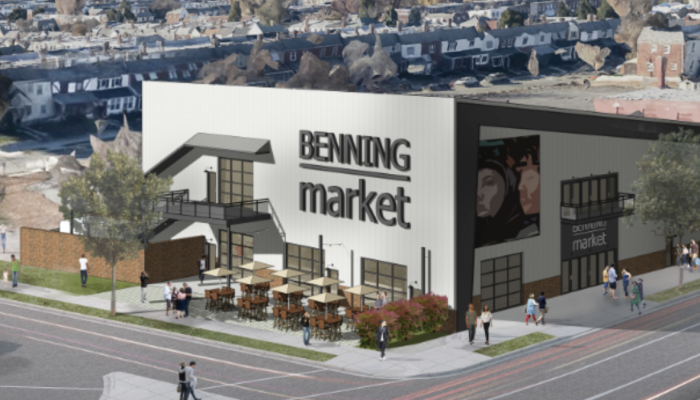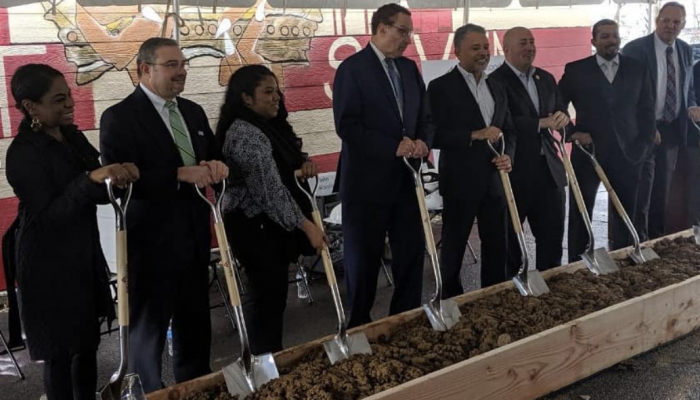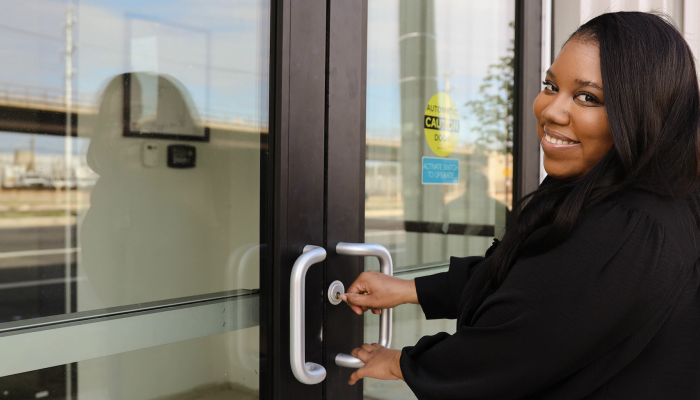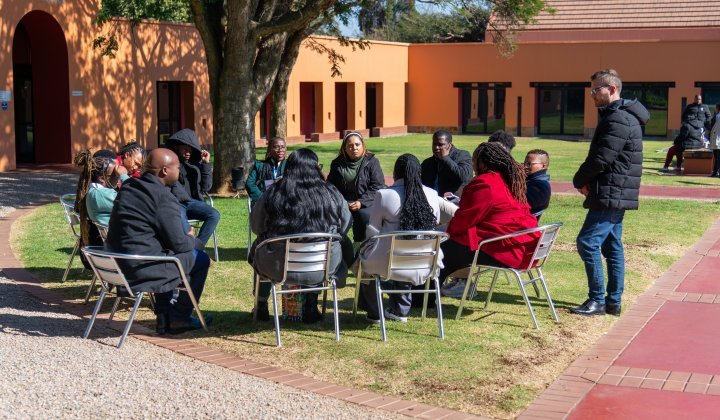The United States of America currently enjoys a reputation as a global leader in commerce, business and politics. Historical studies show that Native American peoples traded with each other extensively across the continent for thousands of years, and this legacy of economic industry culminated in the so-called “Gilded Age” of entrepreneurship around the mid- to late 19th century after the American Civil War. Extensive rail networks connected the East and West Coasts, allowing floods of newly arrived immigrants, all eager for a slice of the American dream, to fill the country with novel skills and ideas.
A new generation of community and business leaders in Washington, DC is expanding and redefining this venerable legacy, and Mary Blackford is one of them. In many ways, Blackford is the quintessential American entrepreneur. She is bright, eloquent, and passionate, with a true appreciation for the power of entrepreneurship and its potential to fundamentally change communities in sustainable ways, and her roots run deep in the community in which she works. “I grew up in Southeast DC, on Benning Road. Ward 7 is so special to me. I’m from there. It’s my home ward.”
Entrepreneurship at school
It was while she attended the Business and Finance Academy at HD Woodson High School, the only public high school in her ward, that the entrepreneurship bug bit her hard. “Part of the curriculum was making sure that we had a financial and business education. The curriculum in the entrepreneurship course was provided by the Network For Teaching Entrepreneurship (NFTE) that provides curriculums to high schools and also gives kids seed money to start a business.”
A trip to New York City and the chance to craft business models and present them to an audience at regional conferences convinced Blackford that being an entrepreneur was the only career path for her. “I’m such a showwoman. I love getting up in front of people. I thought ‘Is this what entrepreneurship gets you? Why isn’t everyone doing this?’”
Teaching entrepreneurship in South Africa
Blackford’s tertiary education at Babson College in Massachusetts, a private 104-year-old institution focused exclusively on business and entrepreneurship, gave her the opportunity to travel to South Africa through a partnership with Stellenbosch University in 2009. There, Blackford and her colleagues taught business training to local high school students. Her previous experience through the NFTE gave her a solid foundation for this work. “I was excited to provide that curriculum to the students. They learned a whole lot and I’m still connected to some of those students who are now doing amazing things.”
She and nine of her classmates paired up with 10 students at Stellenbosch University to teach at five different high schools in the Western Cape. Blackford was placed at Masibambane High School. “It was special to be teaching kids that looked like me.” Blackford relates. “The students were great. Ambitious. Smart. And so imaginative about the solutions they wanted to bring to their communities. As a kid that grew up in poverty, I get that opportunities like this can be life changing.”
Blackford witnessed first-hand the intrinsic power of entrepreneurship, of shared passion and its ability to erode cultural and racial divides. “It makes such a difference when you give people access to each other and don’t keep them siloed. It gave [the kids] a great perspective on entrepreneurship and the difference it can make when you’re in a room full of people with diverse, brilliant ideas.”
Community-focused financing
Without investment in capital and infrastructure, many fine business ideas die a slow death. Once she left Babson, Blackford realised this was where she wanted to focus her energy. Socially responsible finance, she says, is an industry focused on community-centered banks and financial institutions that are in some cases supported by the US government and geared towards supporting and uplifting socially responsive initiatives such as female empowerment, education and, importantly for Blackford, nutrition.
“When you’re from somewhere, you don’t realise some of the issues until you leave. I thought checking expiration dates (on food) was normal, to get items from the back of the shelves, not the front. We do that because we don’t trust the food in the grocery stores.” As a vegetarian in Ward 7, Blackford was racking up huge travel costs just to access fresh products, so she started to engage with business leaders and policymakers to bring relief to what she terms "food deserts"; urban areas traditionally sidelined by healthier food suppliers because the average median income doesn’t guarantee them profit.
Washington, DC’s mayor, Muriel Bowser, is acutely aware of the economic and nutritional disparities in her city. Her Food Access Fund (FAF) initiative, under the deputy mayor’s office of planning and economic development, has allocated grants to the value of over $10m, all focused on Wards 7 and 8, Blackford’s home turf.
“Within the next year, we are bringing eight new small businesses that are providing food to the community in our new food hall located in Ward 7. By next year, there should be 12 new food businesses in Ward 7.” By facilitating access to funding for small and medium food enterprises and helping to build sustainable food-focused business models, while leveraging her contacts in the community and local government, Blackford is changing the food landscape of her neighbourhood in ways that would have been nearly impossible just 10 years ago.
Market 7
On the corner of Benning Road and 36th Street NE in Ward 7, an ultramodern steel, concrete and glass warehouse space has been built, surrounded by indigenous plantings. This is Benning Market, home to Blackford’s brainchild, Market 7.
Her time in South Africa and a trip to Takoradi in Ghana to teach entrepreneur and business courses in 2011 convinced Blackford that a community doesn’t need to wait for external entities to step in to provide it with resources. “There were these central marketplaces in Ghana and South Africa that sold fresh food every day. This allowed me to see cooperative economics within communities in a very dynamic and sustainable way. We used to do pop-up markets and work with farmers to bring out produce and we would sell that to the community”.
These small but successful community markets, where vendors would pool resources and help each other out, brought Blackford to the realisation that she needed a permanent space from which her suppliers and partners could operate, so ground was broken for Benning Market in 2020.
The focus of the Market is three-pronged: It will be a place where residents of Ward 7 can buy fresh, farm-to-table products, while also being able to sell their products and be supported and nurtured as entrepreneurs. Blackford spent time working with the people in Wards 7 and 8, where Market 7 would be located. Using Lego blocks, she and a group of 70 residents and community stakeholders plotted out what they would like to see available at the market based on demographic segments, so while the lower level of the market will be food-focused, the top level will cater to a wide array of lifestyle services. All businesses at Market 7 will be 100% Black owned. Read more at www.benningmarket.com.
An entrepreneurial case study
Blackford’s success story illustrates the results of the US federal government’s emphasis on the financing of entrepreneurs who are working towards remedying historical legacies of separate development in US cities like Washington, DC. Public-private partnerships between entrepreneurial training initiatives such as the NFTE and high schools and colleges in low- to medium-income neighbourhoods are producing thoughtful business leaders, like Blackford, from within the communities that they serve. Entrepreneurs who have benefitted from this educational model are inherently better able to respond to the needs of those who live and work in these spaces.
While her education and training are undoubtedly an important part of her skill set, it was Blackford’s commitment to her home ward and the needs of the people in it that spurred her to success.
“Change comes from within the community first,” she says. “What’s been helpful for me is working with communities to find opportunities of engagement. The community is my team.”
By building business models within a symbiotic framework where the unique requirements of urban environments inform the structure of her enterprises, Blackford is ensuring the longevity and sustainability of her projects. “Entrepreneurial innovation can play a huge role in society, in solving systemic issues. Entrepreneurship can be advantageous in terms of creating new systems. That’s the benefit of business, right? We have the opportunity to create systems that create a necessary impact in the communities that need it most.”
Blackford’s five tips for entrepreneurial success:
- Having a quality education with a focus on reading, writing, and financial literacy is critical. “Writing is so important. A great writer can literally change how the world views a problem and a solution. That can be a game changer.”
- Spend time consulting with experts in the field in which you want to build a business. For Blackford’s fight for food justice, this meant meeting with nutritional advocates, farmers, residents of her community, and food producers. “Find your community in whatever you do.”
- Hone your business plan writing skills. “I’m such an advocate of a business plan. Do the research. Find out what the industry looks like. Understand your addressable market. Write down your goals. Figure out how much money you need to raise. What will your business look like five years from now?”
- Run your financial projections and budgets by a community bank or financial consultant. “Putting your plan in front of experts is something you need to do to test your own understanding. It will only make you stronger.”
- Take care of yourself and prioritise your health. “Drink water. Don’t overwork yourself. The culture of entrepreneurship sometimes is unhealthy. Get enough sleep.”








